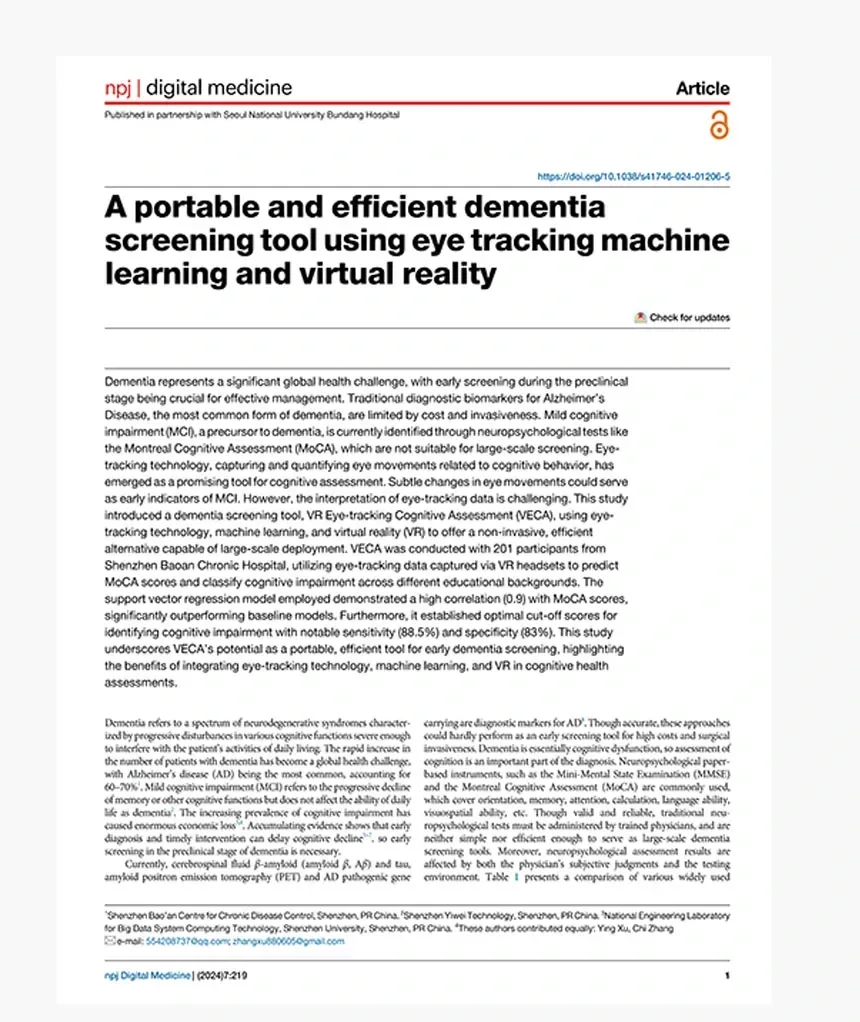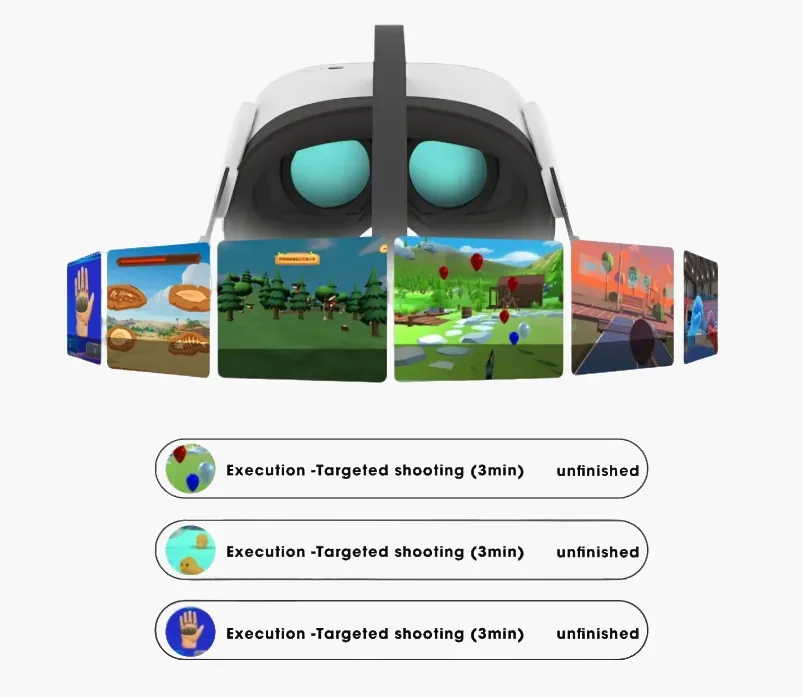
Progressive studies confirms that interactive virtual spaces program can significantly advance the well-being of persons diagnosed with brain function deterioration. By moving them to peaceful locations, VR supplies a exclusive option for thought encouragement, psychological balance, and relational exchange. Multiple evaluations have proved that VR therapy can reduce fretfulness, concern, and despair in dementia those diagnosed while also elevating their recall, engagement, and conversational capabilities.
- VR provides participants with dementia to revisit treasured recollections through participative reenactments.
- Also, it can deliver a comfortable and assisting space for relational participation, fostering a consciousness of attachment and affiliation.
- Experts conclude that VR therapy has the prospect to innovate dementia assistance by yielding new and novel avenues to deal with the complicated challenges faced by subjects affected by this syndrome.
Advanced Digital Care for Cognitive Support in Alzheimer's
Developing software-based approaches are demonstrating potential in the sphere of cognitive enhancement for people suffering from neurodegenerative Alzheimer type. These interfaces leverage technology to enhance brain performance and maybe reduce the progression of the illness. Engaging activities, personalized recommendations, and brain-computer training are some samples of tactics being explored in this flourishing territory. While examinations are being conducted, digital therapeutics offer a additional channel for boosting the quality of those suffering from neurodegenerative Alzheimer type.Digital Terrain Exploration in Alzheimer's Disease Management
For patients battling Alzheimer health issue, the continuous decline of cognition and mental skills can notably compromise their capability to communicate with the immediate surroundings. This debilitating condition often leads in withdrawal, displeasure, and a reduced self-perception. Recent advancements in virtual reality technology deliver a trailblazing pathway to combat these challenges by building immersive experiences that can engage the brain and renew cognitive function.
Digital reality environments formed specifically for Alzheimer's individuals can take them in acquainted settings, such as their childhood home or a treasured public park, invoking positive memories and decreasing anxiety. Through interactive exercises, these virtual places can also enhance cognitive abilities like remembrance, alertness, and problem-solving.
The possible gains of virtual reality in Alzheimer's care are massive. Early evaluations have revealed promising results, with subjects experiencing improvements in cognitive operation, mood, and overall quality of life. As this development progresses, it holds the key to changing the way we approach Alzheimer's disease, presenting a new pathway for therapy and advocacy.
Virtual Reality Reminiscence for Alzheimer's
Reminiscence therapy is an established technique used to augment cognitive function and mental state in individuals with Alzheimer's disease. This historic form of therapy involves encouraging patients to remember past experiences, often through discussion. However, a innovative approach is emerging: VR-mediated reminiscence therapy.
This immersive tool utilizes virtual reality headsets to transport patients in virtualized environments that recapture memories from their past. By reliving these computer-generated environments, individuals with Alzheimer's can connect with their past in a impactful way.
VR-Based Approaches for Memory and Cognitive Enhancement in Dementia
Virtual reality (VR) is emerging as a up-and-coming device in the fight against dementia, providing cutting-edge ways to boost memory and cognition. By crafting immersive simulations, VR can guide individuals with dementia reexperience memories, interact in meaningful activities, and augment cognitive faculties. Studies have established that VR interventions can produce marked improvements in memory recall, attention, and orientational awareness. Moreover, VR provides a secure and favorable space for individuals with dementia to explore, reducing feelings of isolation and nervousness.
- Furthermore, VR can be fitted to individual needs and preferences, facilitating expanded levels of engagement.
- Acknowledging the capabilities of VR, extended research is needed to fully understand its long-term outcomes in dementia care.
Memory Revival and Social Renewal: VR's Role in Alzheimer's Community Engagement
Simulated simulated realms is emerging as a advanced platform in the discipline of Alzheimer syndrome. By designing immersive and communicative environments, VR has the prospect to spark memories, build social interaction, and enhance the overall quality of life for people living with Alzheimer's. Among the most impressive aspects of VR is its ability to shift users to nostalgic areas and memories from their past. Whether it's a walk through a childhood home or a illustration of a beloved holiday, these virtual experiences can conjure happy memories and solidify cognitive function. Furthermore, VR can assist social interaction by connecting individuals with others who share similar experiences. This can be particularly rewarding for people with Alzheimer's who may face difficulties with traditional social involvement. By maintaining a safe and engaging virtual space, VR can minimize feelings of isolation and loneliness, which are common among users affected by Alzheimer's. Overall, VR holds immense capacity for improving the lives of individuals with Alzheimer's by reawakening memories, reinforcing connections, and refining their quality of life. As technology keeps on improve, we can expect even more imaginative applications of VR in the field cognitive function reheablation of dementia care.Applying Cognitive Training: Applying VR to Alleviate Alzheimer's Symptoms
Virtual reality is rapidly emerging as a revolutionary tool in the realm of cognitive training, particularly for clients managing Alzheimer's disease. By immersing patients in interactive and engaging virtual environments, VR-based interventions can improve cognitive functions such as memory, attention, and problem-solving. These games regularly incorporate elements of storytelling, exploration, and social interaction, making the training process greatly immersive. Studies have shown that VR-based cognitive training can lead to pronounced improvements in cognitive performance, conceivably delaying the progression of Alzheimer's symptoms. Moreover, VR provides a safe and controlled environment for patients to practice new skills and enhance their confidence.
- Game-driven approaches in VR training can make it deeply absorbing and pleasant for persons with mental decline.
- VR simulations can offer genuine scenarios that spur and energize cognitive functions.
- Personalized VR experiences can cater to special tastes and systems.
Virtual Reality as a Renewed Opportunity for Dementia Patients
Mesmerizing digital environments offer a breakthrough and encouraging avenue for individuals living with dementia. These tools can recreate familiar environments, allowing those affected by cognitive decline to revisit cherished memories and foster a sense of security. By easing the symptoms of dementia, VR settings have the option to improve quality of life for both users and their guardians.
- Trials indicate that VR interventions can effectively impact cognitive function, affective well-being, and even bodily abilities in individuals with dementia.
- Moreover, VR furnishes a safe and protected environment for examination, reducing the risk of stress.
- Likewise, VR can facilitate social interactions by allowing individuals with dementia to participate in online activities with others.
Game-Changing VR Solutions for Early Alzheimer's Assessment
Alzheimer's disease shows a sophisticated puzzle, often continuing unnoticed in its early stages. Despite this, virtual reality (VR) is gaining traction as a advanced tool for early discovery. Through immersive virtual worlds, VR can monitor cognitive function in ways that traditional methods cannot cope to. This capacity allows for early treatment strategies, potentially reducing disease progression and optimizing the quality of life for participants with Alzheimer's.
- Immersive virtual tests evaluate cognitive functions like recall and focus in protected settings.
- Personal VR platforms promote user engagement in cognitive enhancement practices.
- VR worlds offer empathetic environments for interaction among those affected by Alzheimer's.
Bridging the Gap: Virtual Reality for Communication and Participation in Dementia Care
{In the realm of dementia care, innovative technologies are emerging to enhance the lives of subjects facing dementia challenges. Virtual reality (VR) is one such system that holds immense potential for bridging the communication and interaction gap often experienced by those with dementia. By providing enthralling virtual settings, VR can boost cognitive function, reduce behavioral issues, and ultimately improve the overall well-being of subjects managing dementia.
VR experiences tailored to dementia care can range from reminiscence therapy sessions that take clients to known past settings, to interactive games that promote social interaction and cognitive training. Furthermore, VR has the aptitude to connect individuals with dementia to their loved ones, regardless of physical isolation, fostering a sense of acceptance.
- VR can assist in reducing agitation and anxiety by providing a calming and enticing environment.
- Assessments have shown that VR interventions can lead to improvements in cognitive function, mood, and social interaction in people affected by dementia.
- As technology evolves in advance, we can expect even more innovative and {effective|beneficial|helpful|powerful|impactful|successful|productive|efficient
